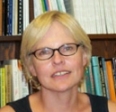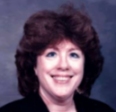|
So
Long, Anne A Conversation Daiva Markelis and Anne Zahlan |
|
| Y |
our roots are in the South, and you've spent many years in the
As a matter of fact, yes, but in a strange way. Rather than being shocked or offended by anyone or anything, I found people and landscape disconcertingly mild. As when I first went to the American University of Beirut and noted that the students never seemed to gossip, only to realize that the gossip was in Arabic, I was a little slow in picking up the strong feelings under the midwestern surface. As a stranger, I felt amazingly left alone — but it didn't take long before people made their opinions and judgments known. Still, I have found east central Illinois a place that permits more privacy and self-protectiveness than the more overtly passionate communities I had been accustomed to.
You've been at Eastern for twenty-four years. How has the university changed since you first started teaching here? What's better? Worse?
The university has changed for the better in every way that I can think of. On one basic and important level, as the result of long years of struggle, we are now paid a living wage. In general, faculty members are treated with more respect than they were in my early years at Eastern. Additionally, the campus is much more attractive than it was when I came, and there are activities and opportunities available to faculty and students that did not exist then.
In the early years I taught here, few of my students had been outside
Illinois; now every class has students who have traveled outside the
United States. The increased emphasis on study abroad and the incorporation
of Harlaxton summers and now semesters into our program has transformed
our students. Over the past twenty-four years, the university as a
whole, as well as our department, has become more diverse in curricula,
faculty, and students. The excitement generated by the new Asian
Studies Minor embodies the new spirit at Eastern. All these developments
have enriched the education we offer as well as the quality of the
life we share.
Are there particular memories that stand out for you concerning life in the English Department?
To begin with, who could forget Dr. Quivey's opening gambit when he called to set up an interview at MLA: "I don't suppose you remember this place, but. . . ." At least I was spared the ordeal of being asked to admire the horrible statue of Lincoln that now graces the resort east of town.
When I arrived, the department faculty was beginning the transition from a sixties generation for whom every party held out the dream of replicating Woodstock. Non-smoking and vegetarianism lay in the future, and some rather intense beverage consumption and athletic competition marked the way to the urbane group we are today.
Having been appointed advisor to Sigma Tau Delta AND The Vehicle very soon after I arrived, I was relieved when after a year doing everything by myself, John David Moore joined the department and came to my rescue as co-advisor. I remember many get-togethers at my house, picnics at Fox Ridge, Vehicle editorial sessions, and grand poetry readings. In the old days, besides walking four miles to school, we had to collate the Vehicle ourselves. The editors and I went over to the DEN to proof the text, and we did the lay-out the old-fashioned way. Finally, piles of printed sheets had to be picked up, collated by the staff, and then transported to an office (presided over by a phenomenally grouchy man) to be stapled and later picked up again for distribution. We did have fun though — just ask Kathy Olsen and Tammy Veach and Bob Zordani.
As for the Sigma Tau Delta initiations — at which David Radavich one year and David Carpenter the next read works that, as advisor, I might have preferred they not read — and the regional restaurants that requested that the English Department not come back next Christmas, we'll leave those memories alone. Speaking of the holiday season, however, anyone who was around can never forget the huge feasts that Betty Hawkins staged in the office and seminar rooms, with Bill's barbecue as culinary centerpiece.
You've written and lectured on post-colonial fiction, the literature of the American south, and twentieth-century British literature. You're an expert on Lawrence Durrell and Thomas Wolfe. This is an admirably wide range of interests, especially in this age of narrowing specializations. Is there a common thread that connects the writers and themes you're attracted to?
The
paradoxically unifying principle in my work, as in my life, is the
contradiction between home and exile. Some such tension characterizes
the life and work of
What are your plans for retirement? Will you continue to write and publish? Any travel plans? Somehow I can't imagine you sitting on the beach eating bon-bons.
Nor can I. I do love the sea and I will enjoy being a little closer to it, but the eating bon-bons part is out — although I might be persuaded to sip some wine. I do intend to write and go to conferences and publish, and I plan to keep on editing The Thomas Wolfe Review for a few more years. My problem is choosing which of my many research interests to follow up on.
David
and I will move to North Carolina and in doing so we are choosing
to be closer to family, immediate and extended. We plan to spend
time with family members and especially the youngest generation.
As for travel, we already have trips to Paris planned for the next
two summers: a Durrell conference in 2008 and a Wolfe conference in
2009. On my list of places I want to revisit (besides France) are
the Al-Hambra and southern Spain, Morocco, Portugal, England, and
Scotland. David has close friends in
Although professional and intellectual interests will continue to play a large part in my life, I look forward to having more time for personal and family life.
What do you feel have been your greatest accomplishments here at Eastern?
I'm very proud of whatever small part I have played in maintaining the principle of shared governance in university affairs. Although times are peaceful now, such was not always the case, and I have stood up publicly to provosts and presidents of the past. During my nine years on the Faculty Senate (one year as Chair), I fought for the right and the responsibility of the faculty to know what was going on and to have meaningful input into the formulation and implementation of university policy. I am also proud of the behind-the-scenes role I played in the accomplishments of UPI when David was chief negotiator and then president. For those many years, our lives were devoted to bettering conditions for faculty while at the same time contributing to academic quality and university life.
On the department level, I'm proud to have played a role, along with Tim Shonk, in beginning the transition from the "fifth-year" M.A. program of twenty-four years ago to the solid graduate program in English that we have today. I am happy to leave knowing that both the graduate program and the department as a whole are in such wonderful hands; I'm very confident that both will continue to thrive.
The accomplishments that give me the most satisfaction have to do with students. I have encouraged students to believe themselves capable of graduate work and professional achievement; I have helped many to finish their degrees and to go on to doctoral programs and/or professional success, and many of them are thoughtful enough to tell me that I've made a difference. My great-great grandfather taught college mathematics to women before, during, and after the Civil War, and he is one of many educators on both sides of my family. I'm happy to have been privileged to continue that tradition.
What will you miss the most about Eastern?
The
I will miss teaching (not grading) — reading texts I value with our students and arriving at new insights by listening to their responses. Most of all, of course, I will miss my colleagues and friends, but we hope that many of you will come visit us in "the promised land"!
top | this issue | agora home

